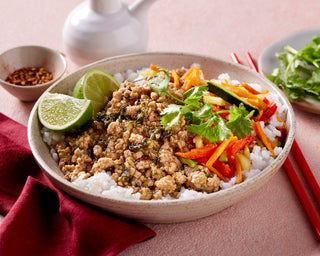Are you interested in a sure fire, flu fighting remedy? Take one very healthy balanced diet, shake it up with regular bouts of physical activity, remove all major stressful ingredients and leave it to rest undisturbed, for at least 8 hours every night. While there really is no revelation to this magic flu fighting formula, scientists are identifying the small steps we can all take to boost our chances of surviving the winter cold and flu season. Steps that can work in the real world of late nights, multi-tasking demands and those “too cold to exercise” excuses. And much of the work focuses on the intricate links between foods, their nutrients and a strong, infection fighting immune system. Let’s explore the latest nutrition research:
Winter fruits and vegetables
Malnutrition has long been recognised as the major cause of immunodeficiency worldwide and there’s no better way to boost your nutrient intake than eating a rainbow of fruits and vegetables in season. Fabulous winter fruits and vegetables on offer include kiwi fruit and tangelos for vitamin C, plus spinach, pumpkin and sweet potato for beta carotene. But the real news lies in the vast array of antioxidants just bursting to tell their flu fighting stories. Recent studies published in the Proceedings of the Nutrition Society of New Zealand have indicated that kiwi fruit may enhance the body’s natural immune response. Kiwi fruit has high levels and a unique balance of carotenoid antioxidants, previously shown to boost natural levels of resistance.
Oily fish
It used to be vitamin C spelt immunity, but now vitamin D is the new booster on the block. Vitamin D has effects on white blood cell function and is being investigated for its role in treating autoimmune disease. Getting that little ray of sunshine is particularly important in winter months as vitamin D is produced from the contact of UV sunlight on the skin. You can also increase your dietary sources of vitamin D like margarines, boosted milks, oily fish and liver. Oily fish also supplies a vital dose of omega 3 fatty acids, an important anti-inflammatory nutrient.
Probiotic yoghourts and prebiotic fibres
Research has previously shown that individual probiotic strains can boost immunity, however a recent study has looked at the power of combining three different types of probiotics with prebiotic dietary fibres, known as a symbiotic. Prebiotics are in essence a vital source of food for probiotic bacteria and include many wholegrain fibres as well as the fibre ingredient inulin. The study results published in the Journal of Clinical Gastroenterology show that this powerful combo or symbiotic significantly reduced the incidence and severity of respiratory diseases during the cold season within the study participants.
Almonds
Packed with healthy oils, almonds along with other nuts and vegetable oils, are a particularly good source of vitamin E, another immune boosting vitamin. Vitamin E supplementation has been shown to enhance antibody response to flu vaccination in the elderly. However there have also been concerns over negative effects of high dose vitamin E supplementation. So the best approach is to follow the food first principle and enjoy portion controlled snacks of almonds with naturally occurring vitamin E.
Red onion
There’s no reason why you can’t eat salads in winter especially when you include some thinly sliced red onion. Red onions contain Quercetin, which is a naturally occurring chemical in certain foods which has been shown to reduce the likelihood of developing colds and flu …in mice! It’s still early days for human trials but eating foods rich in Quercetin won’t do you any harm. Other quercetin containing foods include capers, fennel, capsicum, red grapes and tea.
Oats
Finally while the saying goes, “starve a fever” you really want to avoid severe kilojoule restriction during winter as this can weaken your immune defence. Previous national nutrition surveys have shown that breakfast eaters are more likely to meet their daily nutrient requirements than skippers and keep a healthy weight. So make sure you start the day right with a hearty, warming breakfast in winter like oats with a sprinkle of brown sugar and cinnamon.
Article written by Karen Inge, and first published on www.kareninge.com.au




